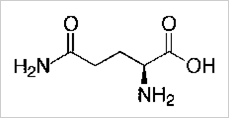

| WHAT IS L-GLUTAMINE? | |
L-glutamine is a protein amino acid found in proteins of all life forms. It is classified as a semi-essential or conditionally essential amino acid. This means that under normal circumstances the body can synthesize sufficient L-glutamine to meet physiological demands. However, there are conditions where the body cannot do so. Recently, L-glutamine has come to be regarded as one of the most important of the amino acids when the body is subjected to such metabolic stress situations as trauma (including surgical trauma), cancer, sepsis and burns. Under such conditions, L-glutamine becomes an essential amino acid, and it is therefore very important to ensure adequate intakes of the amino acid in order to meet the increased physiological demands created by these situations. L-glutamine is the most abundant amino acid in the body, and plasma glutamine levels are the highest of any amino acid. L-glutamine is predominantly synthesized and stored in skeletal muscle. The amino acid L-glutamate is metabolized to L-glutamine in a reaction catalyzed by the enzyme glutamine synthase, a reaction which, in addition to L-glutamate, requires ammonia, ATP and magnesium.
|
L-Glutamine Structural Formula |
|
|
| BACK TO RECOVERY EDGE |
